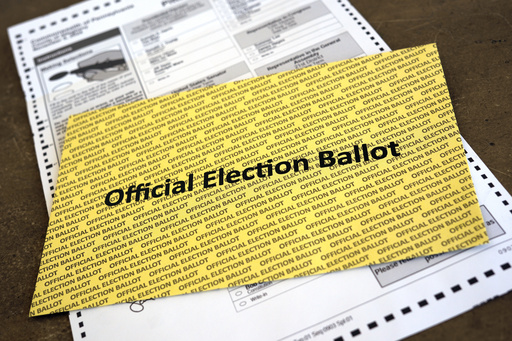
“`html
ATLANTA — The voting mechanism for overseas voters, including military personnel stationed outside the U.S., has recently come under political scrutiny. This process is regulated by federal law and enforced by the states, with Republicans raising concerns about how these voters are treated. This marks a shift from the 2020 election when former President Donald Trump and his followers contested the results but did not focus on overseas voting issues.
As Election Day approaches, with a close race anticipated between Trump and Vice President Kamala Harris, Republicans are implementing a broader strategy that could facilitate legal challenges should Trump lose. Ballots have been dispatched to overseas and military voters by a federally mandated deadline. Trump and his allies now argue that these ballots could be part of a larger scheme to undermine the election process, a theory lacking supporting evidence. This contention comes at a time when it appears that increasing numbers of these voters are from demographics that typically support Democratic candidates.
The context around these voters is critical. The Uniformed and Overseas Citizens Absentee Voting Act, enacted by Congress in 1986, mandates that states permit military members, their families, and U.S. citizens residing abroad to register and vote absentee in federal elections. In the 2020 election cycle, over 1.2 million ballots were dispatched to military and overseas voters, with more than 900,000 returned and nearly 890,000 counted, as per data from the U.S. Election Assistance Commission.
Historically, military voters primarily represented the absentee voting demographic; however, by 2020, overseas voters accounted for about 57.4% of registered voters in this category. Notably, 40% of all military and overseas ballots came from three states: California, Florida, and Washington, suggesting a political shift. This shift may explain why Trump and some Republicans are scrutinizing the absentee voting program, as military voters tend to favor the GOP, while overseas voters are perceived to lean Democratic. In fact, the Democratic Party has allocated funds this year to motivate overseas voter turnout!
To help military and overseas voters participate in elections, federal law facilitates the process. Eligible voters can simultaneously register and request an absentee ballot using a federal postcard application (FPCA). This is particularly useful for those facing challenges like delayed mail. Many states now permit electronic submission of the FPCA, and voters must provide basic personal details such as name, address, date of birth, and identification, which helps verify their eligibility.
Contrary to the notion that anyone can request a ballot, applicants must substantiate their status as eligible U.S. citizens. The application includes an oath, affirming that the information is accurate and that they are not disqualified from voting. Notably, overseas voters may register using an address they haven’t lived at for years, a practice allowed by the majority of states to aid citizens born abroad.
Currently, certain Republican lawmakers are pressing for stricter verification of military and overseas voters in Pennsylvania, aiming to have their ballots distinctly separated for the upcoming election. They allege that current practices have compromised the election system’s integrity. In 2020, around 5% of military and overseas ballots in Pennsylvania were rejected—a significantly higher rate compared to most other states.
This sudden influx of allegations surrounding international ballot fraud aligns with a well-documented pattern from Trump and his supporters, who have frequently raised concerns about widespread fraud in U.S. elections, despite a lack of evidence. Investigations and audits from the 2020 election reaffirmed President Joe Biden’s victory, with even Trump’s former attorney general asserting that no proof of substantial fraud existed.
Trump has made various unsubstantiated claims regarding non-citizens voting, mail ballot forgeries, and hostile election technologies, which aim to foster skepticism toward the legitimacy of elections he does not win. Concurrently, Trump has made attempts to differentiate between military voters and others residing overseas, as the Democratic Party has begun targeting these voters—ultimately, this could backfire for Republicans, considering that challenges could affect military voters they typically rely upon during tight elections.
In light of these developments, Republican representatives argue that their legal actions are designed to safeguard electoral integrity. They emphasize the need to address known vulnerabilities ahead of the upcoming elections.
Election officials are raising concerns that this late challenge to established laws—already in place for over a decade—is problematic. Instances of ineligible votes in Pennsylvania are statistically low and heavily monitored. The Democratic National Committee has also intensified its efforts to dismiss challenges presented in Pennsylvania, arguing that these legal actions could cause chaos and disenfranchise many eligible voters.
“`
